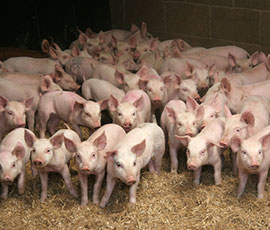Swine dysentery warning after Yorkshire outbreaks

Pig farmers in Yorkshire are being advised to remain vigilant for symptoms of swine dysentery following three recent outbreaks.
Although it is believed the outbreaks in the north and east of the county have been contained, strict biosecurity is still needed to prevent any further spread.
Farmers seeing any form of diarrhoea on farm should get a test to confirm the cause.
Speaking to Farmers Weekly, Helen Clarke, interim veterinary programme manager for BPEX, explained the importance of testing so targeted treatment could be applied.
“On the back of work we have done with the AHVLA, we have found some strains of swine dysentery to be resistant to antibiotics, meaning the only other options for these herds would be to close down.
“Swine dysentery is not a massive problem at the moment and it is not unexpected at this time of year. However, when a unit does go down with it, it can be a big problems especially with antibiotic resistance to some strains limiting treatment.”
Helen Clarke, BPEX
“If you are testing your herd for dysentery, ask for a multilocus sequence typing test in addition, as this will identify which strain of swine dysentery is present and will help with control measures. There may also be some funding help from BPEX for this test,” she added.
Ms Clarke said good biosecurity was vital to prevent further spread. “Swine dysentery is spread by muck and can live up to 60 days. It can also be moved about by rodents. So it’s important to keep muck away from pigs, do not contaminate feed stores, try and prevent feed wagons coming on farm and use your own blow pipes where you can. Disinfection of vehicles in also important,” she added.
All three of the units experiencing outbreaks were part of the Swine Dysentery Producer Charter , a voluntary initiative setup to alert people to risks in the area. Ms Clarke urged other to join in order to remain alert of localised risks.
“Swine dysentery is not a massive problem at the moment and it is not unexpected at this time of year. However, when a unit does go down with it, it can be a big problems especially with antibiotic resistance to some strains limiting treatment.”
(More on swine dysentery)

